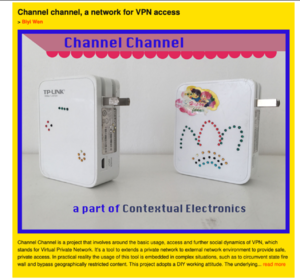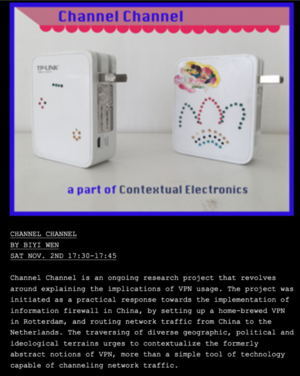User:)biyibiyibiyi(/04/extra
Our Networks Conference
link to event: https://github.com/ournetworks/2019-submissions/issues/14
Description
Channel Channel is a project that involves around the basic usage, access and further social dynamics of VPN, which stands for Virtual Private Network. It's a tool to extends a private network to external network environment to provide safe, private access. In practical reality the usage of this tool is embedded in complex situations, such as to circumvent state fire wall and bypass geographically restricted content.
This project adopts a DIY working attitude. The underlying technology is provided by PiVPN, an open source free software that runs on a Raspberry Pi. As the Pi is connected to a home network, it's able to provide VPN access.
I initiated this project as a response to my personal practical situation. As I live in the Netherlands, I travel back to China from time to time. The state fire wall blocks access to services such as Google, YouTube, Twitter and Instagram. My mail service is dependent on Gmail, I do watch YouTube for occasional "guilty pleasure", not to mention the tutorial I followed on how to set up PiVPN is from a YouTuber. Aside from services that are not blocked by the firewall, access to content sometimes also can be slow, due to more distant network traffic route.
But, this project is not only about building access. It's also about questioning access. On the first day I connected my roommate in Beijing with VPN access, he was exhilarated, from being cut off from videos on YouTube for months. Few days later, he felt fed up with YouTube. This result motivates me to rethink about access - access is not only about providing plain infrastructural mobility, but also about fostering a collective discourse on what is means to receive access to restricted platforms and content hosted therein.
I am currently reaching out to develop a network of people to formulate richer discussions around the infrastructure. I spoke to people who live in China who had the need to for VPN access. I also would like to develop a network of access providers, who live out of China and have unrestricted access to internet, and are willing to "channel" a portion of their home network to others. To participate in Our Networks is an opportunity reach out to people and foster this network. I will also be interested in reaching to Chinese communities in Toronto, as many of them will be in similar situations as myself, or have families and friends who live without access and they may found willing to share access with.
Reflection
To be able to present in Our Networks conference exposed me to the current discourses on network infrastructure not only in Rotterdam, or Netherlands, or Western Europe, but in North America. The projects offered by the conference are very inspiring. Here in the conference I came across a project on retro-networking project by researcher from the Media Archaeology Lab in Boulder, libi striegl. Her project further led me to the field of network archaeology. I also had an very barely-scratched-the-surface look into practices of DIY networking in the U.S. and Canada, and the backgrounds of the people who run these projects. It's valuable to see these comparisons, and to have multilateral exchanges based on these differences.
Although during previously experiences, especially during Special Issue launch events and presentations at conferences such as at the Urgent Publishing conference, I was able to explain the backgrounds, insights and urgencies of projects, the presentation at Our Networks was the first time to independently address a particularly personal issue. After the presentation I received positive feedback, and the participation confirmed my interest in developing programs/practices that's able to contribute and interface with the public by the sharing of insights and hands on practices.
Zine Camp Rotterdam
Description
Channel Channel is an ongoing research project that revolves around explaining the implications of VPN usage. The project was initiated as a practical response towards the implementation of information firewall in China, by setting up a home-brewed VPN in Rotterdam, and routing network traffic from China to the Netherlands. The traversing of diverse geographic, political and ideological terrains urges to contextualize the formerly abstract notions of VPN, more than a simple tool of technology capable of channeling network traffic.
Reflection
As Amy announced the agenda for Zine Camp I was very excited to participate - everybody is invited, and it's less about the displays of zines, more about the making and interactions based around zine culture. Like did in the Our Networks conference I was able to meet people and exposed to their interests. One of the projects I encountered was the Parasite zine archive, by the Arnhem Zine Depot's Mark. The zines produced from PDFs, articles and publications that used parasite as the primary metaphor. To me Mark is doing a way of piracy, based on "tacitly approved" consensus. In addition to the gesture of piracy, I also found the metaphor of parasite addressing to an existential dimension of daily lives that's worth contemplating upon.
As for the speech, I wasn't entirely happy about it. In Our Networks conference, I recorded a video, so I didn't face the challenge of addressing to a group of audience with my presence. At zine camp, due to limitation of time and lack of energy, I played the video and tried to address a few key concepts and questions of my project. I've been always frustrated by public speech. It's not about speaking that frustrates me, but about scoping the speech. At a public event, without familiarity with the audience, it was a constant distraction and frustration for me to speak to a void. Although I do understand that it's important to speak what is important and sufficient...
Graduate Applications
During the past few months I prepared my application to graduate program. The process helped in the following aspects:
- Define what is urgent to pursue a in depth research
- Think of how to rely on, and work with institutional organizations
- Find ways to be taken seriously and develop research and practice further
Linux Presentation Day
Angeliki introduced me to the organizers of Linux Presentation Day in Leeszaal, and I will participate in an upcoming session in January. I hope my participation can contribute involving 1. young users 2. immigrant and minority users to trying out Linux.


